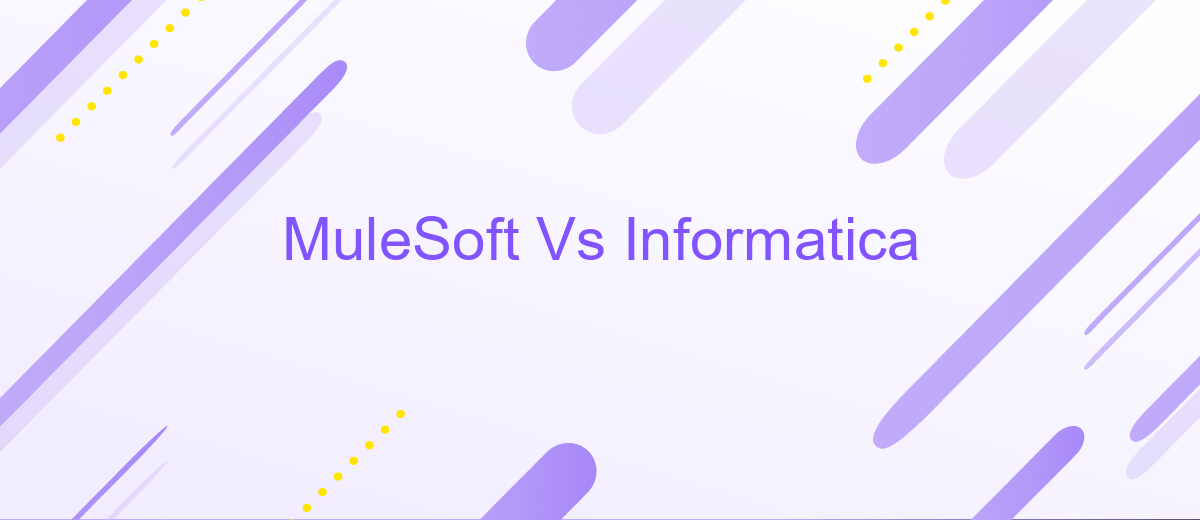MuleSoft Vs Informatica
In the rapidly evolving landscape of data integration and management, choosing the right platform is crucial for business success. MuleSoft and Informatica are two leading contenders, each offering unique strengths and capabilities. This article delves into a comparative analysis of MuleSoft and Informatica, examining their features, performance, and suitability for various business needs to help you make an informed decision.
Overview
MuleSoft and Informatica are two leading platforms in the integration space, each offering unique features and capabilities to streamline business processes. MuleSoft is known for its API-led connectivity approach, allowing organizations to build and manage APIs with ease. On the other hand, Informatica specializes in data integration, providing robust tools for data management, quality, and governance.
- MuleSoft: API-led connectivity, Anypoint Platform, real-time integrations
- Informatica: Data integration, data quality, data governance
- ApiX-Drive: Simplifies API integrations, user-friendly interface, supports multiple platforms
Both platforms aim to enhance operational efficiency and data accessibility, but they cater to different needs. MuleSoft focuses on connecting applications through APIs, making it ideal for businesses looking to modernize their IT infrastructure. Informatica, with its strong emphasis on data, is perfect for organizations needing comprehensive data management solutions. Additionally, services like ApiX-Drive can complement these platforms by offering simplified API integration, making it easier to connect various software and services seamlessly.
Key Features

MuleSoft offers a robust set of features designed to streamline integration processes and enhance data connectivity. Key features include its Anypoint Platform, which provides a unified solution for API management, design, and implementation. MuleSoft also excels in real-time integration capabilities, allowing businesses to connect applications and data sources seamlessly. The platform supports a wide range of connectors, making it versatile for various enterprise needs. Its visual interface and drag-and-drop functionality simplify the integration process, reducing the need for extensive coding knowledge.
Informatica, on the other hand, is renowned for its data integration and management capabilities. Its Intelligent Data Platform utilizes AI and machine learning to deliver high-quality data integration and governance. Informatica's suite includes powerful tools for data cataloging, quality, and master data management. Additionally, the platform supports complex data transformations and extensive ETL (Extract, Transform, Load) processes. For businesses looking to automate and optimize their data workflows, Informatica offers a comprehensive solution that ensures data accuracy and consistency across various systems.
Architecture and Integration

MuleSoft and Informatica offer robust solutions for enterprise integration, but their architectures differ significantly. MuleSoft operates on an API-led connectivity approach, leveraging reusable APIs to connect and orchestrate various systems and data sources. This modular architecture facilitates faster development and easier maintenance. In contrast, Informatica employs a more traditional Extract, Transform, Load (ETL) architecture, which is well-suited for large-scale data integration and warehousing projects.
- MuleSoft's architecture is designed around APIs, enabling seamless integration through its Anypoint Platform.
- Informatica focuses on ETL processes, providing comprehensive tools for data extraction, transformation, and loading.
- Both platforms support cloud and on-premises deployments, but MuleSoft's API-centric model offers greater flexibility for modern, microservices-based architectures.
For businesses looking to streamline their integration processes, tools like ApiX-Drive can be highly beneficial. ApiX-Drive simplifies the setup of integrations between various applications and services without requiring extensive coding knowledge. This can complement both MuleSoft's API-led approach and Informatica's ETL processes, providing an additional layer of efficiency and automation.
Use Cases and Industries

MuleSoft and Informatica are pivotal players in the realm of data integration and management, each offering unique solutions tailored to specific use cases and industries. MuleSoft, with its Anypoint Platform, is renowned for its API-led connectivity approach, making it ideal for businesses looking to modernize their legacy systems and seamlessly integrate various applications. On the other hand, Informatica excels in data governance, data quality, and master data management, making it a preferred choice for enterprises focused on maintaining high-quality data across diverse sources.
Both platforms serve a wide range of industries, including finance, healthcare, retail, and manufacturing. MuleSoft's robust API management capabilities are particularly beneficial for sectors requiring real-time data integration and agile development. Informatica's strengths lie in its comprehensive data management solutions, which are crucial for industries with complex data landscapes and stringent regulatory requirements.
- Finance: Real-time transaction processing and fraud detection.
- Healthcare: Patient data integration and compliance with health regulations.
- Retail: Omnichannel customer experience and inventory management.
- Manufacturing: Supply chain optimization and IoT data integration.
For businesses looking to streamline their integration processes, services like ApiX-Drive can complement these platforms by offering easy-to-use, no-code integration solutions. This allows companies to automate workflows and connect various applications without extensive technical expertise, further enhancing operational efficiency.
Pricing and Licensing
MuleSoft offers a subscription-based pricing model that scales according to the number of integrations and the complexity of the use case. Their pricing tiers include options for small businesses to large enterprises, providing flexibility and scalability. MuleSoft's licensing includes access to their Anypoint Platform, which encompasses API design, management, and integration capabilities. The cost can vary significantly based on the specific needs and scope of the project, making it essential for organizations to evaluate their requirements carefully.
Informatica, on the other hand, employs a more traditional licensing model, often involving upfront costs and annual maintenance fees. Informatica's pricing is typically based on the number of users, data volume, and specific features required. This can make it more predictable in terms of budgeting but potentially less flexible for scaling. For organizations looking to streamline their integration processes, services like ApiX-Drive can be a valuable addition, offering automated integration solutions that can complement both MuleSoft and Informatica environments, enhancing efficiency and reducing manual efforts.
- Automate the work of an online store or landing
- Empower through integration
- Don't spend money on programmers and integrators
- Save time by automating routine tasks
FAQ
What are the main differences between MuleSoft and Informatica?
Which platform is better for real-time data integration?
Can both MuleSoft and Informatica handle cloud integrations?
What are the deployment options for MuleSoft and Informatica?
Are there any services to assist with the implementation and integration of these platforms?
Routine tasks take a lot of time from employees? Do they burn out, do not have enough working day for the main duties and important things? Do you understand that the only way out of this situation in modern realities is automation? Try Apix-Drive for free and make sure that the online connector in 5 minutes of setting up integration will remove a significant part of the routine from your life and free up time for you and your employees.


